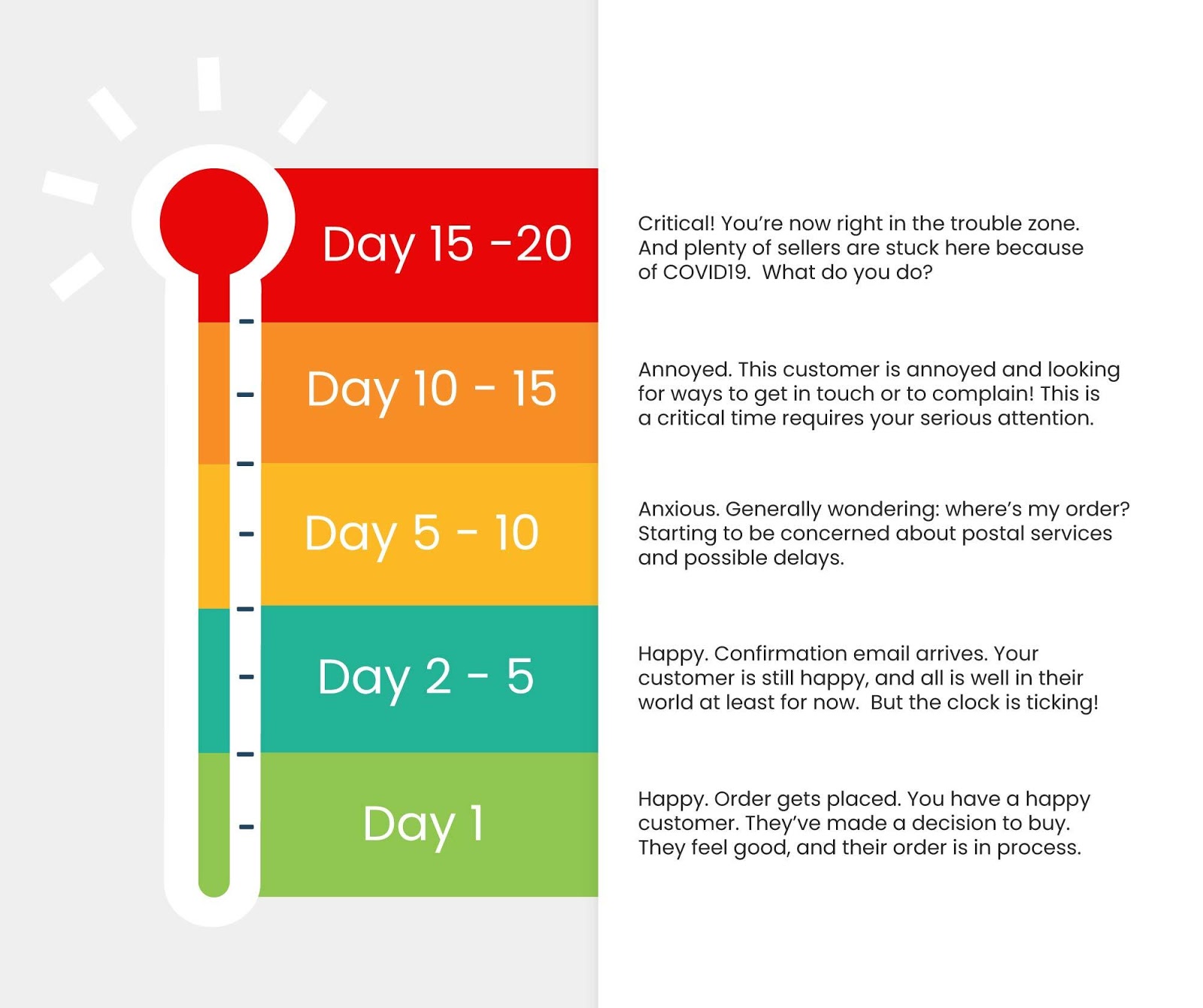How to understand the Critical Time Frame for Customer Complaints
Written by
Editorial TeamPublished on

When it comes to online shopping, the ultimate seal of approval is the ‘confirm purchase’ button. In placing an order, a customer is communicating many things.
They’re saying they like your product, that it’s better than your competitors and they like the price.
Immediately after placing an order, you have a happy customer, in a state of optimistic anticipation.Their order is being processed and all is good in the world.

Although this is the final action in the customer sales process, it’s the beginning of another. By hitting the purchase button your customer is also starting an imaginary timer.
Understanding the significance of this timer is key to keeping your customers happy and protecting your good reputation. Not letting this timer get out of hand will reduce customer worry, negative feedback and the likelihood of complaints.
This critical time frame has been changed somewhat because of Covid-19 and it’s important you understand just how dangerous this can be to your business.
Right now, more than a third of the world’s population is on some sort of restricted movement. Having been forced to temporarily close doors, traditional retail markets are in turmoil.
There is uncertainty about whether businesses are still delivering, if staff are working as normal and if travel restrictions are impacting order fulfilment. This uncertainty is feeding into the critical timer. Here’s how it’s playing out.
Why is the Critical Time Frame So Important to Understand?
Do you know the critical period where your customer is more likely to complain? Have you conducted a proper customer analysis to get prepared? Below are three key reasons why understanding this critical time frame is so important today.
1.Customers in Lockdown Are More Likely to Get in Touch
In an analysis of over 40 million orders made in March 2020, customer support software solution eDeskreported a 28% increase in customer orders, but a much larger (54%) increase in customer enquiries. During lockdown, customers are bored, impatient and more anxious about the whereabouts of their order. As the data shows, these customers are much more likely to reach out to sellers. This becomes more pressing as they reach the latter stages of our customer worry barometer.
2.Hitting Peak ‘Complaint Zone’ Leads to Bigger Issues
If you’re delivering internationally, or if your delivery times are being delayed due to Covid-19, you run the risk of hitting that peak ‘complaint zone’. This can lead to much greater challenges for your business. Valuable time gets taken up with customer support calls.
Customers are more likely to leave negative reviews and feedback. This can affect your reputation, your sales ranking and ultimately, your bottom line. Left unchecked, this can lead to order cancellations and serious business loss.
3.One Bad Experience is One Too Many, Even During Lockdown
Everyone is aware of the elephant in the room that’s responsible for the delays, the confusion and the disruption. But even still, a bad experience is hard to forget.
According to a recent report from PWC, 32% of all customers said they would “stop doing business with a brand they loved after just one bad experience”.
This might seem unfair but it underlines the need to respond quickly and keep your customers in the loop.
How to Keep Customers Happy During Covid-19
eDesk has published a list of recommendations for handling customer queries and complaints during Covid-19.
1.Set expectations with proactive communication. From the moment a customer places an order, be sure to manage their expectations. If you are experiencing delays, let them know right away through an automated response. It’s better to address it sooner rather than later.
2.Focus on SLAs. Even when expectations are set, customers still need reassurances. While spikes in customers enquiries are expected, don’t let standards fall.
3.Update your returns policy. 30% of all products ordered online are returned. Having a robust returns policy will increase online orders and reduce confusion if and when inevitable returns have to happen. Make sure you review your returns policy with respect to COVID delivery schedules.
4.Deal with delivery queries effectively. Put manual templates in place that use smart snippets that input accurate customer information.
5.Don’t leave customers in the dark. Ensure auto-responders are in place during weekends and busy periods.
eDesk is a cloud-based help desk solution for eCommerce that integrates individual online stores, email platforms, social media channels and all major marketplaces. It supports more than 30 marketplaces including Amazon, eBay, Allegro, WooCommerce, Shopify, and Magento. From now until September 2020, eDesk is free for new customers. For more information and to get started click here.


